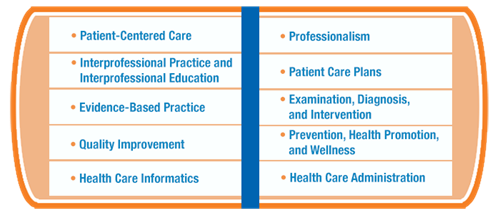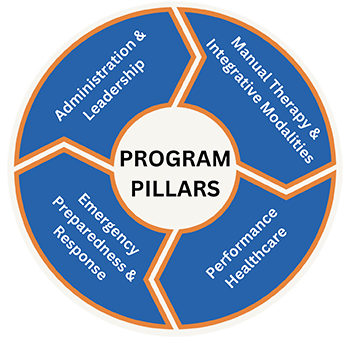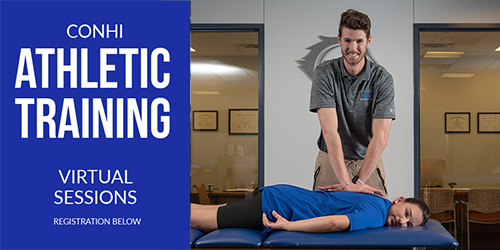Program Overview
The UTA Master of Science in Athletic Training features nationally recognized faculty, highly experienced preceptors, a multitude of clinical rotation options, and outstanding sports medicine facilities. Students receive in-depth classroom and laboratory instruction focused on injury prevention, assessment and diagnosis, acute care, and therapeutic interventions for managing musculoskeletal injuries and common medical conditions in physically active individuals. The UT Arlington MSAT is a two-year cohort-based professional (entry-level) program designed to prepare students for the Board of Certification Inc. (BOC) examination and licensure in any state, leading to a career in athletic training.
The didactic, laboratory, clinical, and simulation experiences of the program are structured around the CAATE 2020 Professional Standards, which address the following:

The MSAT degree is a challenging, two-year, five-semester 57 semester credit hour program. All new, incoming students begin the degree in the month of June. The program sequence involves 2 summer semesters (11 weeks in length), and 4 long semesters (15 weeks in length). Students will be required to complete a minimum of 5 semesters of clinical rotations involving direct patient care in an approved health care setting. Two of these clinical rotations will be completed in clinical immersion in the DFW area or beyond, and identified based on students' career goals.
In order to complete the degree, students must meet the retention requirements which include both academic and professional behavior standards, as described on the MSAT Retention Criteria and Policy section.
Program Options
Option 1: Two-Year Program. This option is for students who will have already completed a bachelor’s degree and the required prerequisites when the program begins (summer).
Option 2: Accelerated (3+2) Program. This option allows students to complete a Bachelor of Science in Exercise Science and a Master of Science in Athletic Training degree in only 5 years. The Bachelor of Science degree will be conferred in the 4th year and the Master of Science degree at the end of the 5th year.
*Students interested in this program should work very closely with their advisor to ensure they are on track to enter the MSAT program at the appropriate time.
Mission
The Master of Science in Athletic Training Program at the University of Texas at Arlington is committed to developing proficient and competent graduates through high-quality classroom and clinical instruction that emphasizes patient-centered holistic healthcare. Graduates will be prepared to pass the Board of Certification exam for Athletic Training, to advance health and the human condition, and will excel in areas of performance healthcare, manual therapy and integrative modalities, emergency preparedness and response, and administration and leadership.”
Accreditation
Our athletic training program was established at UTA in 2001, with the MSAT offered since 2013. We have been accredited by the Commission on Accreditation of Athletic Training Education (CAATE) since 2006. In March 2019, after an excellent review, our program was reaccredited through the 2028-2029 academic year.

CAATE Program Information and Outcomes Page
Program Features
- Excellent first-time pass rate on the Board of Certification Exam
- Wide variety of clinical sites and preceptors
- 26 total weeks of clinical immersion that can be completed in DFW and beyond
- Faculty who are recognized at the state, regional, and national level, with a variety of experiences and expertise who are all 100% dedicated to the MSAT program.
Four Pillars to the UTA MSAT Curriculum

Performance Healthcare
Movement is medicine. Our students learn to use functional assessment and biomechanical analysis to design and implement targeted individualized corrective exercise and performance programming to rehabilitate an injury, mitigate the risk of injury, and optimize performance.
Manual Therapy and Integrative Modalities
Our students learn how to use evidence based manual techniques and modalities to enhance patient/client care and recovery.
Emergency Preparedness & Response
Our students learn to integrate best practices in immediate and emergency care, including implementing emergency action plans, triaging the severity of health conditions, and applying appropriate evidence-based emergent care procedures.
Administration and Leadership
Our students learn how to manage and resolve conflict, communicate effectively, advocate for yourself and the profession, develop a business/growth mindset, collect, analyze, and use data, assess risk, and engage in strategic planning.
Courses
Degree requirements are listed in the University Catalog. Students are governed by the catalog under which they were enrolled or, at the student’s option, the catalog of any subsequent year in which that student was in residence.
Specific course descriptions for the MSAT program can be found in the Kinesiology Graduate Programs page in the Catalog.
Degree Plan
UTA MSAT students entering the program in 2023 or later will complete the following course sequence: MSAT Course Sequence (2023).
Admission Requirements
Official admission requirements for the MSAT program are described in the University Catalog for Department of Kinesiology Graduate Programs.
Requirements for Admission: Two-year program
- Earned Bachelor’s degree, with an undergraduate cumulative GPA of 3.0, or a 3.0 GPA during the last 60 hours of undergraduate course work.
- 50 hours of observation with an athletic trainer (LAT and/or ATC credential, prospective students may use this form to log observation hours, or another means of documentation if they choose). NOTE: This PDF form is meant to be downloaded and printed. It is not web accessible.
- Measles, Mumps and Rubella (MMR) vaccination
- Hepatitis B vaccination (three doses)
- Proof of current certification by the American Heart Association in Basic Life Support (Only AHA BLS certification will be accepted)
- International students are required to receive tuberculosis screening and this must be performed at the UTA Student Health Center or another U.S. facility
- International applicants must meet the University’s English language test score requirements for graduate admission.
- Successful interview with the MSAT admissions committee.
- Required prerequisite courses *Prerequisite courses must have been completed with a grade of “C” or better and within the last 10 years.
- Anatomy and Physiology I
- Anatomy and Physiology II
- Functional Anatomy (must be upper division and may also be titled Applied Kinesiology, Kinesiology, or Biomechanics)
- Physiology of Exercise
- Nutrition
- Psychology
- Statistics or Research Design
- Biology (lecture and lab)
- Physics (lecture and lab; will accept PHYS 3360 from UTA students)
- Chemistry (lecture and lab)
- Preferred Prerequisite Courses
- Medical Terminology
- Care and Prevention of Athletic Injuries
Requirements for Admission: Accelerated (3+2) program
- Must be within 30 hours of graduation with a BS in EXS
- Must have completed at least 30 hours of study at UTA with a 3.3 GPA or better
- A 3.3 overall GPA for all college courses
- 50 hours of observation with an athletic trainer (LAT and/or ATC credential, prospective students may use this form to log observation hours, or another means of documentation if they choose). NOTE: This PDF form is meant to be downloaded and printed. It is not web accessible.
- Measles, Mumps and Rubella (MMR) vaccination
- Hepatitis B vaccination (three doses)
- Proof of current certification by the American Heart Association in Basic Life Support (only AHA BLS certification will be accepted)
- Successful interview with the MSAT admissions committee
- A ‘C’ or better and 3.3 GPA in the following prerequisite courses:
- Anatomy and Physiology I
- Anatomy and Physiology II
- Functional Anatomy
- Physiology of Exercise
- Nutrition
- Psychology
- Statistics/Research Design
- Biology (lecture and lab)
- Physics (lecture and lab; will accept PHYS 3360 from UTA)
- Chemistry (lecture and lab)
Probationary Admission
Applicants failing to meet the unconditional admission criteria may be considered for probationary admission with documented previous relevant experience and recommendations describing potential for exceptional personal and professional growth. Students who are admitted on a probationary status, will be required to meet with the MSAT faculty to develop a success plan, and must complete their first term with a 3.0 GPA.
Criminal Background Check
All students initially accepted for admission into the MSAT will be required to complete a criminal background check prior to final acceptance. Students who have a criminal record are encouraged to meet with the MSAT Program Director to discuss how this may affect their ability to become credentialed as an athletic trainer. Note: A form is sent via email from UTA with instructions. Any applicant with a criminal background will be evaluated on a case-by-case basis by the program faculty. Prospective students should also consider the BOC certification exam eligibility criteria as it relates to candidates with felony or misdemeanor charges and convictions and Texas licensure eligibility for applicants with prior criminal convictions.
Application
Applications for the Summer 2026 cohort are now open in the Athletic Training Centralized Application Service (ATCAS).
There are a limited number of ATCAS fee waivers available to qualified students. Find out more here. The MSAT Program accepts applications through rolling admissions and will continue until the cohort is filled. Due to a summer start date, no applications will be accepted after April 1st of the application year. Students pursuing the accelerated (3+2) option will apply in their 3rd year at UTA. International students are strongly encouraged to apply by December of the year before they intend to begin the program.
The application process will occur as follows:
- The applicant completes the ATCAS application, including completing all sections, ordering transcripts, and requesting recommendations. A personal statement, resume/curriculum vitae, and documentation of a minimum of 50 hours of observation with an athletic trainer must also be included.
- The MSAT admissions committee reviews the application and determines whether the applicant will be invited for an interview.
- The applicant is contacted and if invited for an interview, the interview is scheduled (in-person or virtual via Teams).
- The applicant completes the interview with the MSAT admissions committee.
- The committee makes a decision regarding the applicant’s acceptance.
Applicants will be evaluated based on their GPA, grades in designated prerequisite coursework, strength of references, personal statement, resume/curriculum vitae, verification of observation hours, and strength of interview.
If the applicant receives initial acceptance, they must complete the following to enter the program:
- UT Arlington Graduate application via ApplyUTA
- Submit a signed technical standards form, signed consent to release vaccination information form, and immunization record
- Submit proof of current certification by the American Heart Association in Basic Life Support (only AHA BLS certification will be accepted)
- Complete a criminal background check
Cohort numbers are dependent on classroom space and availability of clinical sites. Once a cohort is filled, remaining applicants who meet the program criteria will be placed on a wait list. Applicants receiving a letter of acceptance can choose to place themselves on the wait list, but will be placed at the bottom and may only accept a position in the program at a later time if the cohort is not full.
MSAT Retention Criteria and Policy
Academic Retention Criteria: Two-year program
MSAT students’ academic and clinical progress will be closely monitored each semester. To remain in the MSAT program, students must:
1. Complete each course with a grade of C or better.
Students who earn below a C will be dismissed from the program.
2. Maintain a 3.0 cumulative GPA.
Students who earn below a 3.0 cumulative GPA will be placed on academic probation for one semester. If the student does not earn a cumulative GPA of 3.0 or higher by the end of the probationary semester, the student will be dismissed from the MSAT program.
Students on academic probation will be required to create an academic success plan, submitting to the faculty 2 weeks after the start of a summer term or 3 weeks after the start of a long semester.
Students who do not gain good academic standing with the program after one semester of probation will be dismissed from the program.
3. Adhere to documents which outline professional behaviors, including but not limited to the MSAT Student Handbook, the BOC Standards of Professional Practice, the NATA Code of Ethics, and course syllabi.
For professionalism offenses, a Student Conduct Digression Report will be completed. If a student obtains 3 of these, they will be dismissed from the program (3 strikes and you're out rule). If a professional offense is especially egregious, a student may be dismissed from the program with only 1 digression report.
Academic Retention Criteria: Accelerated (3+2) program
- Maintain a ‘B’ or better in the following courses:
- KINE 5120 Clinical Athletic Training I
- KINE 5229 Functional Anatomy & Biomechanics for the Athletic Trainer
- KINE 5230 Foundations of Orthopedic Assessment & Therapeutic Interventions
- KINE 5236 Prevention, Health Promotion, and Wellness
- KINE 5332 Assessment and Management I
Students who earn below a B in any of these classes will be dismissed from the program.
- Complete each additional course with a grade of C or better.
- Students who earn below a C will be dismissed from the program.
- Maintain a 3.0 MSAT GPA.
- Students who earn below a 3.0 MSAT GPA will be placed on academic probation for one semester. If the student does not earn a MSAT GPA of 3.0 or higher by the end of the probationary semester, the student will be dismissed from the program.
- *Students who have not yet completed their bachelor’s degree will be able to take undergraduate electives to complete their bachelor’s degree. They will also be eligible to apply for regular admissions to the MSAT program upon completion of their bachelor’s degree.
- Adhere to documents which outline professional behaviors, including but not limited to the MSAT Student Handbook, BOC Standards of Professional Practice, the NATA Code of Ethics, and course syllabi.
- For professionalism offenses, a Student Conduct Digression Report will be completed. If a student obtains 3 of these, they will be dismissed from the program (3 strikes and you're out rule). If a professional offense is especially egregious, a student may be dismissed from the program with only 1 digression report.
Clinical Education
Clinical Sites
The MSAT Program primarily utilizes a variety of clinical education sites throughout the Dallas-Fort Worth Metroplex.
- All Saints Episcopal School
- Allen Americans
- Arlington Bowie High School
- Arlington High School
- Arlington Lamar High School
- Arlington Martin High School
- Arlington Sam Houston High School
- Baylor, Scott & White Outreach
- Children's Andrew's Institute
- Dallas Jackals
- Dallas Wings
- DeSoto High School
- Euless Trinity High School
- FC Dallas Soccer
- Frito Lay
- June Shelton School
- Midlothian Heritage HS
- Motion is Medicine
- Newman Smith High School
- North Texas Soccer Club
- Panther City Lacrosse
- Sideline Orthopedic and Sports
- South Grand Prairie High School
- Southern Methodist University
- Texas Legends
- Texas Orthopaedic Associates
- Texas Sports Rehab
- TMI Sports Medicine
- University of North Texas
- University of Texas at Arlington
- University of Texas at Dallas
The following clinical sites have also been used for full-time immersion experiences for students who chose to go outside of DFW:
- Coastal Carolina University
- Denver Broncos
- Houston Methodist & Houston Ballet Academy
- Las Vegas Aces
- New York Giants
- The University of Alabama
- University of Texas at San Antonio
- University of the Incarnate Word
Clinical Education Plan
YEAR 1
Year 1 Objective: Expose students to all required patient populations. By having students meet all requirements by the CAATE by the end of Year 1, there will be more flexibility to generate individualized clinical rotations in Year 2.
11-week academic term
No clinical experiences |
7–8-week
clinical
rotation |
7–8-week
clinical
rotation |
7–8-week
clinical
rotation |
7–8-week
clinical
rotation |
Simulations will occur
to expose students
to standardized patients and
to practice skills learned in this
semester in preparation
for Fall clinical
experiences
|
Year 1 required clinical days: Tuesdays/Thursdays, Fridays after morning clinical class
Student interests will be considered in placements.
Students may experience the following settings/patient populations:
Pediatric patients/secondary school setting
Clinic (Rehabilitation or Physician Practice)
Collegiate/Professional Sports
Emerging Settings (I.e. industrial, outreach
|
YEAR 2
Year 2 Objective: Develop individualized clinical education plans that support the career aspirations for each student.
11-week full-time immersion
Beginning of June through mid-August
Local or distance sites
|
Hybrid class/clinical schedule
Year 2 required clinical days:
Mondays/Wednesdays,
Fridays after morning
clinical class
Incorporate Mission
Arlington Clinic (primary care
clinic) experience 1-2 times
throughout the semester
|
15-week full-time immersion
Middle of January through
beginning of May
Local or distance sites |
Site will be determined based on students’ career goals, settings and/or patient populations they would like more exposure to, etc.
The number of rotations and timing of rotations throughout Year 2 will vary by student.
(For example, a student who wants to work with collegiate basketball can get that clinical experience during the season (Oct-Mar) and that rotation can span both fall and spring. Other clinical experiences will be assigned before and after the season as appropriate.)
The UTA MSAT Degree: Excellent Value
Estimated Tuition and Fees
Our MSAT program offers a tremendous financial value for the student desiring a career in the field of Athletic Training. The table below shows an estimate of tuition and fees for the MSAT degree by semester. At UTA, accounts are due each semester prior to class start.
*For non-residents, tuition and fees can be estimated using the graduate nonresident tuition chart found here. Students will take 7 credit hours their first summer, then 10 credit hours each term after that (5 more terms).
| Summer (7 credit hours) |
$4,474 |
| Fall (10 credit hours) |
$6,425 |
| Spring (10 credit hours) |
$6,425 |
| Year 2 |
| Summer (10 credit hours) |
$6,425 |
| Fall (10 credit hours) |
$6,425 |
| Spring (10 credit hours) |
$6,425 |
| Total Estimated Cost of Tuition and Fees: |
$37,124 |
Athletic Trainer Salaries and Job Outlook
The 2023 NATA Salary Survey indicated the average salary for a full-time Athletic Trainer is $68,907, while the average salary in District 6 of the NATA (Texas and Arkansas) is $74,139. According to the U.S. Bureau of Labor Statistics, employment of athletic trainers is projected to grow 14% through 2032, much faster than average for all occupations.
International Students
The following additional fees apply to international students: Foreign insurance (health insurance) fee, international education fee, and international student service fee. Click or tap here for more information from the Office of International Education.
Additional Costs
MSAT students will incur the following additional costs associated with the pre-admission and post admission portion of the program.
Admissions Costs: Costs associated with entering the program
| ATCAS Application |
$99 (if only applying to UTA, email the program director to inquire about a discount code) |
| Physical Exam |
$25 at the UTA Student Health Center |
Hepatitis B Immunization:
Series of 3 shots |
Cost variable; required |
| Mumps, Measles, Rubella Immunization |
Cost Variable; required |
| Hepatitis A Immunization |
Cost Variable; recommended |
| Tetanus Immunization |
Cost Variable; recommended |
| Meningococcal Immunization |
Cost Variable; recommended by the MSAT Program; may be required by UTA if the student is under 22 years of age (UTA Meningitis Requirement webpage) |
| COVID-19 Immunization |
Cost variable; recommended |
Post-Admissions Costs: Costs Ongoing while enrolled in the program
| Clothing: Khaki pants/shorts and tennis shoes |
Cost Varies by Type, Brand, and Vendor |
| Transportation |
Cost Varies based on clinical assignment location in the DFW area. Students are responsible for arranging transportation to and from clinical sites; carpooling is encouraged. |
| On-Campus Parking |
$282 per year for a UTA Student Parking Permit (most commonly purchased student permit; rate for AY 25-26). Required if parking a vehicle on campus. Cost is set by the UTA Parking and Transportation Office. |
| Typhon Clinical Tracking Software |
$100 |
| Tuberculosis (TB) Blood Test |
Varies by Vendor, usually around $70. Required by some off-campus affiliated sites. |
| Drug Screening |
Varies by screen type and vendor. Drug screening is required for some off-campus sites. |
| Graduation Application Fee |
$40; required for your degree to be conferred and to officially complete your academic program, usually submitted at the beginning of the student's final semester.
Also includes the printing and mailing of the graduate's physical diploma. |
| Commencement Celebrations |
$160 for Commencement Regalia (Academic Cap, Gown and Hood), required if participating in Hooding and/or Commencement. |
| Simulation Fee |
$75 Summer 1, $150 Fall/Spring1 and Fall 2. |
Credentialing Exams
| Board of Certification Exam for Athletic Trainers (ATC) |
$450, a national certification for Athletic Trainers. Successful completion of the exam and related requirements allows the use of the ATC credential. |
| Texas Licensure (LAT)* |
$360, includes Application Fee, Written, Practical and Jurisprudence Exam Fees, and Initial License Fee. Fees will vary based on the specifics of the test-taker’s situation. Successful completion of the licensing requirements allows the use of the LAT credential.
Texas licensure is required to practice as an Athletic Trainer in the State of Texas. Each state jurisdiction is subject to its own rules. |
*the LAT exam is not required if students pass the BOC exam
Overall Costs
Your total expenses as a graduate student will vary depending on several criteria, including Texas residency, where you live, the particulars of your lifestyle, and much more. The above-mentioned figures are solely representative of tuition and required student fees.
Sources of Funding
Additional Information Concerning Tuition, Fees, and Financial Aid Can Be Found Here:
UTA Admissions, “What Will it Cost”
UTA Admissions, Tuition Estimator
UTA Office of Financial Aid and Scholarships
Add/Drop/Withdraw/Refund
Information concerning adding courses, dropping individual courses and refund policies can be found at this link: Please click or tap here for information concerning UT Arlington’s Policies on Add, Dropping, or Withdrawing from courses (Office of Records).
Return of Funds
Federal, state, or institutional funds may need to be returned if a student withdraws from courses. Further information can be found at this link: Please click or tap here for information concerning return of funds, specifically financial aid funds (Office of Financial Aid).
Footnotes
The estimated figures are to be used for planning purposes only and are not reflective of actual tuition and fees incurred by an individual student. The estimate is based on an in-state resident student beginning the UTA MSAT program in AY 24-25 who progresses normally through the program. It is an estimate of tuition and fees only, and not of additional costs, books, library fines, living expenses, entertainment, parking and transportation, commencement expenses, or the other necessities of life for the graduate student. Your situation will be different from the example.
Helpful Information
MSAT Policies: While University faculty and staff members give students academic advice and assistance, each student is expected to take responsibility for his or her education and personal development. The student must know and abide by the academic and disciplinary policies of the Athletic Training Program, Department of Kinesiology, College of Nursing and Health Innovation, and the University of Texas at Arlington, including rules governing quantity of work, the standard of work required to continue in the University, scholastic probation and dismissal, and enforced withdrawal.
Students will not be relieved of their responsibility to know the policies, deadlines and rules of the University on the grounds that they were not told. If students have questions regarding policies, it is the University’s expectation that the student will consult his/her academic advisor for guidance and resolution.
Course Load: Graduate education requires students to have dedicated time to devote to studying, completing assignments, preparing for, and participating in research activities and other course work. Students are encouraged to consider their work schedules and commitments considering the demands of the MSAT program and adjust accordingly. Commitments which compete with graduate study may result in suboptimal academic performance and place the student in academic jeopardy. We strongly recommend MSAT students do not hold outside employment while enrolled in the program, however if students must be employed we recommend no more than 10 hours per week.
Academic Calendar: Students should review the academic calendar prior to enrolling and prepare accordingly.
Read the MSAT Student Handbook to learn about requirements for the program
Student Success
Academic Advising
The University of Texas at Arlington MSAT program is dedicated to the overall success and retention of our students. One process that contributes to this goal is by providing academic advising to prospective and enrolled students.
Advising for the Prospective Student
We welcome and encourage prospective students to attend an optional academic advising session before program application and start. Those students who have not yet applied or enrolled in the MSAT program are welcome to contact the MSAT academic advisor to schedule a face-to-face, phone, or virtual advising appointment.
Advising for the Enrolled Student
Currently enrolled students may schedule an academic advising appointment at any time.
Learn more on the advising page here.
Required Technical Standards for the UTA Master of Science in Athletic Training
The Master of Science in Athletic Training Program (MSAT) at The University of Texas at Arlington aims for its graduates to become competent and compassionate health care providers who are capable of entering the profession and meeting all requirements for credentialing athletic trainers. Students are expected to develop a robust knowledge base and the requisite clinical skills, professional attitudes, and behaviors, with the ability to appropriately apply their knowledge and skills effectively to interpret information and contribute to patient-centered decisions across a broad spectrum of situations and settings in athletic training.
The following technical standards, in conjunction with the academic standards, are requirements for admission, retention, and graduation. The term “candidate” refers to candidates for admission to the MSAT as well as current athletic training students who are candidates for retention and graduation. UTA’s MSAT program maintains a strong commitment to equitable and accessible educational opportunities for qualified students with disabilities who apply for admission or who are already enrolled. The technical standards may be met with or without reasonable accommodation.
Candidates with disabilities are encouraged to contact the office below early in the admissions or registration process to begin a confidential conversation about what accommodations they may need to meet these standards. This process is informed by knowledge that students with varied types of disabilities have the ability to become successful health care professionals.
Student Access and Resource Center
817-272-3364
sarcenter@uta.edu
University Hall, Room 102
In the event a student is unable to fulfill these technical standards, including but not limited to patient and peer safety, with or without reasonable accommodation, the student may be separated or dismissed from the program.
Observation: Candidates must acquire information as presented through demonstrations and experiences in the foundational sciences. Candidates must also:
- Evaluate patients* accurately and assess their relevant health, behavioral, and medical information.
- Obtain and interpret information through a comprehensive assessment of patients, correctly interpret diagnostic representations of patients' physiologic data, and accurately evaluate patients' conditions and responses.
- Clinical Skills: Candidates must conduct physical examinations and diagnostic maneuvers. These activities require some physical mobility, coordination of both gross and fine motor neuromuscular function, balance, and equilibrium. Candidates must also:
- Ensure general care and emergency treatment for patients and respond to emergency situations in a timely manner.
- Meet applicable safety standards for the environment and follow universal precaution procedures.
Communication: Candidates must exhibit interpersonal skills to enable effective caregiving of patients/clients. Candidates must also:
- Communicate effectively (in English), with all members of a multidisciplinary health care team, patients/clients, and those supporting patients/clients, in person and in writing.
- Clearly and accurately record information and accurately interpret verbal and nonverbal communication.
Clinical Reasoning: Candidates must effectively interpret, assimilate, and understand complex information required to function within the athletic training curriculum. Candidates must also:
- Comprehend three-dimensional relationships and understand the spatial relationships of structures.
- Effectively participate in individual, small-group, and lecture learning modalities in the classroom, clinical, and community settings.
- Learn, participate, collaborate, and contribute as a part of a team.
- Synthesize information both in person and via remote technology.
- Interpret causal connections and make accurate, fact-based conclusions based on available data and information.
- Formulate a hypothesis and investigate potential answers and outcomes.
- Reach appropriate and accurate conclusions.
Judgment: Candidates must exercise good judgment; promptly complete all responsibilities attendant to the diagnosis and care of patients; and develop mature, sensitive, and effective relationships with patients. Candidates must also:
- Effectively handle and manage heavy workloads, function effectively under stress.
- Adapt to changing environments, display flexibility, and learn to function in the face of the uncertainties inherent in the clinical problems of patients.
Behavioral and Social Attributes: Candidates are expected to exhibit professionalism, personal accountability, compassion, integrity, concern for others, and interpersonal skills. Candidates must:
- Accept and apply feedback and respect boundaries.
- Care for all individuals in a respectful and effective manner regardless of race, color, ethnicity, religion, national origin, ancestry, age, disability, status as a veteran, sex, sexual orientation, gender identity, gender expression, genetic information, marital status, parental status, or any other protected status.
Professional Expectations: Candidates must understand, and function within, the legal and ethical aspects of the practice of athletic training. Candidates must also:
- Maintain and display ethical behaviors commensurate with the role of an athletic trainer in all interactions with patients, faculty, staff, students, and the public.
- Maintain interest and motivation throughout the educational processes.
*The term “patient” throughout the document, refers to both patients and clients as referenced in the professional program standards from the Commission on Accreditation of Athletic Training Education






